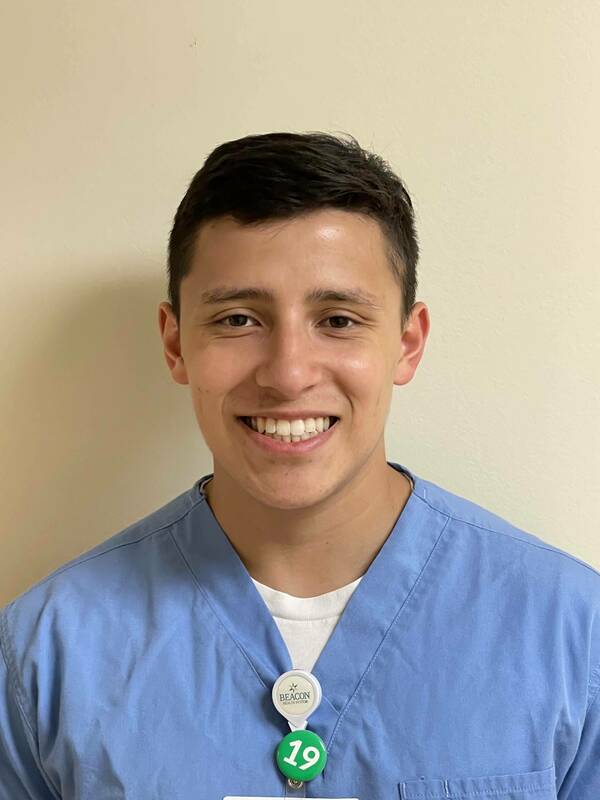
One word resonates throughout rising senior Luis Lopez’s promising future career: Service.
From a young age, Lopez felt called to serve and worked for a community house in a predominantly Latino community. His desire to help others, particularly those of Hispanic and Latino descent, stemmed from witnessing the struggle of his parents, both Mexican immigrants.

“The best thing I could do is help people in the same population, the same community as my parents, and essentially try to be the type of person I know they would have appreciated when they came to America,” said Lopez, who is the first undergraduate intern for Beacon Health System’s stroke program.
On campus, Luis has found great support from the Institute for Latino Studies (ILS), which has offered him several career and service opportunities, including this internship as a stroke patient advocate with the first certified Thrombectomy-Capable Stroke Center in Indiana.
“Latino Studies has truly broadened my educational experience at Notre Dame in conjunction with my biology major,” he said.
Lopez knew he wanted to pursue a career in healthcare after understanding the role of medicine in helping his father overcome polio as a child. Hearing his father’s story sparked an interest in the vastness of neurology, and he yearned to explore the field of medicine.
Yet, he had never pictured himself in the position of attending an institution as prestigious as Notre Dame, or even applying to medical school. Now, surrounded by neurologists at Beacon, Luis is immersed in the very field that inspired his initial interest in medicine. He is exploring one how the Latino population faces many of the risk factors for stroke, such as high blood pressure, high cholesterol, and diabetes.
His internship mentor at Beacon is Dr. Jose Lopez (no relation), neurology medical director and head of the stroke program. Dr. Lopez also serves as a role model for the type of work Luis hopes to pursue in the future. “Luis is dedicated to his career and will undoubtedly further research and practice in the field he ultimately chooses,” said Dr. Lopez.
As a stroke patient advocate, Lopez directly engages in stroke-patient care through patient satisfaction surveys. But he also creates Spanish-language educational resources for the community. Last year, Lopez designed a Spanish-language stroke educational presentation, applying guidelines established by the American Heart Association/American Stroke Association. The presentation shared the basic identification of signs, symptoms, and prevention of strokes in Spanish, which serves as an additional resource for educators when patients prefer to communicate in Spanish. The introduction of this presentation was so successful that it is now used as a clinical resource within the Beacon Health System.
“It is not only about being able to communicate health education in Spanish; it is being able to understand the culture each person is coming from,” said Lopez. “Thinking about medical care, it is best practiced when the patient and the physician both understand the same language, whether that be medical jargon or just having a cultural connection.”
His current goal involves providing authentic, accessible healthcare content that allows patients to better understand the care they are receiving. Adopting these resources to address the specific needs of each Hispanic culture is the challenge ahead. Lopez is grateful to the ILS and Beacon Health System for giving him a glimpse of a future where he can offer that more broadly and in a context of disease to his own patients.
In addition to his work at Beacon, Lopez has participated in on-campus undergraduate research. He has been mentored by Cristian Koepfli, assistant professor in the Department of Biological Sciences, who is also affiliated with the Eck Institute for Global Health, working on malaria research and investigating transmission patterns using a variety of molecular tools. With his mentorship and guidance, Lopez conducted a project that analyzed malaria transmission patterns over the past 20 years. “The project was published in June so it is really rewarding to see all that work pay off,” he says.
He also has volunteered for the South Bend Center for the Homeless, the community center La Casa de Amistad, and a middle school tutoring program. Through ILS, Lopez also interned at the United Farm Workers Foundation in Los Angeles, where he attended policy meetings and even created his own health campaign surrounding heat and hydration safety of farm workers.
“I am confident that he will continue to be an invaluable resource in whichever community he decides to practice, given that he already demonstrates an understanding and commitment to leadership in the crucial continual improvement of systems of care,” said Dr. Lopez.
Originally published by at science.nd.edu on July 13, 2021.